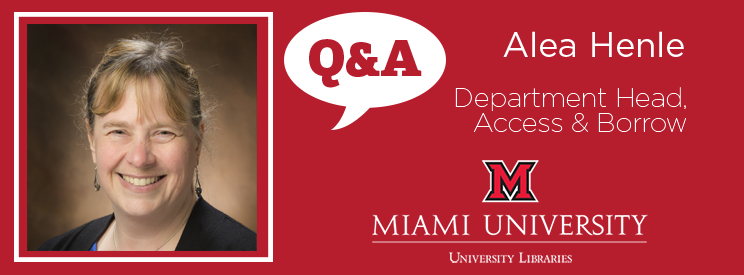
by Vince Frieden, strategic communications coordinator
The Miami University Libraries welcome Alea Henle as head of the newly formed Access & Borrow department.
Access & Borrow serves to connect the Miami community to the materials and resources that support academic success and advance discovery. It encompasses a variety of integral areas, including access services, shelving, circulation and technical services.
Henle comes from Western New Mexico University, where she served as head of public services librarian since 2013. Her employment history includes Colorado State University, University of Wisconsin-Madison, and years in the private sector at a large international law firm. She has a lengthy history of published scholarship, presentations and service to professional library organizations.
Henle holds a bachelor’s degree from the College of Wooster (Wooster, Ohio), an M.S. in Library Science from Simmons College (Boston) and a Ph.D. in history from the University of Connecticut (Storrs, Connecticut).
She recently participated in a brief Q&A to discuss her passion for librarianship and her new role:
Q: What has drawn you to librarianship as a career?
A: I enjoy the rhythm of being a librarian. It gives me regular contact with students and faculty, and I love helping people. Even when I was not a librarian while working on my Ph.D., I couldn’t resist wanting to help people with instructions and directions. You can take the librarian out of the library but never the librarian out of the person.
Q: What excited you about this new role?
A: The mix of responsibilities intrigued me. I appreciated that this new department draws together some areas that historically have often been quite separate. It includes some staff more on the public side and some who make things work behind the scenes. They are all mission-critical groups who enable people to access materials, resources and spaces within the Libraries.
Q: What is your vision for your first 30 days? How about longer-term?
A: My first 30 days will be a lot of meetings and opportunities to listen, ask questions, and see possibilities. Longer-term, we will work together to develop a department identity and foster cross-awareness among the various areas in our department. This will create opportunities for brainstorming. One of the benefits of working with Miami’s well-established libraries and experienced staff are the opportunities to bring a lot of ideas together.
Q: As an experienced librarian, what challenges or opportunities do you see in librarianship today?
A: As a historian who has studied the history of books and libraries, I think there is an evolving definition of what is a library. Is it a place? Is it a collection of books and resources? Is it things? I recently read an article that stated libraries are one of the most trusted places to get information, and that’s a big and appropriate responsibility.
Change is ongoing in libraries, and that distinction between a place and a provider of resources is becoming more important. There are many people visiting the library today without ever setting foot outside their dorm room or office, and it is important to support both physical and virtual library spaces.